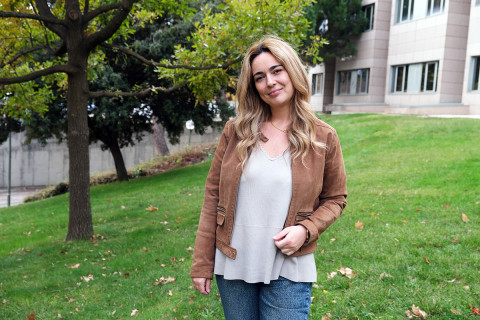Marina González Sánchez joins the CHIRALGEN project as a postdoc

New researchers are arriving at the ICMM to join the CHIRALGEN project, a new group led by Amparo Ruiz Carretero which started on November. One of them is Marina González Sánchez, a chemical scientist from Cáceres who joined the project as a postdoctoral researcher.
Where do you come from?
I’m from Cáceres. I studied Chemistry at the University of Extremadura, and later completed both my Master’s and PhD in Organic Chemistry at the Autónoma University of Madrid.
What have you worked on so far?
My research has focused on supramolecular chemistry, particularly on the self-assembly of π-conjugated systems that form functional nanomaterials. During my PhD, I studied how nucleobase pairing can direct the formation of helical supramolecular architectures, controlling both their structure and their optical and electronic properties.
What will you work on? With whom?
I will be joining the Institute of Materials Science of Madrid (ICMM–CSIC) as a postdoctoral researcher, within the CHIRALGEN project led by Amparo Ruiz Carretero.
This project explores chiral supramolecular assemblies to develop the next generation of organic photovoltaic materials, introducing the Chiral-Induced Spin Selectivity (CISS) effect as a new strategy to improve the efficiency of organic solar cells.
My work will focus on the design and synthesis of π-conjugated materials with chiral and hydrogen-bonding units, the study of their self-assembly, charge transport, and spin selectivity properties, and the fabrication of optoelectronic devices based on these systems.
What excites me most about this project is the combination of supramolecular chemistry, organic electronics, and spintronics, and the opportunity to contribute to an emerging research line with direct impact on the development of clean and sustainable energy technologies.
Why ICMM?
I find the ICMM a very stimulating environment because it combines chemistry, physics, and materials science in a truly interdisciplinary context. I really value its collaborative spirit, its excellent research facilities, and the opportunity to interact with groups working from the fundamental to the applied side of science.
And a personal touch: any hobbies? What would you like to contribute to the institute?
I'm a very creative person, and I enjoy drawing, which has helped me a lot in science communication and outreach.
I like finding visual and accessible ways to explain complex concepts, and I believe this artistic side complements my scientific work very well.
At ICMM, I’d like to contribute not only through my research, but also by promoting science outreach and collaboration between groups, bringing science closer to the public, and fostering an interdisciplinary and creative environment.
Instituto de Ciencia de Materiales de Madrid (ICMM)
Sor Juana Ines de la Cruz, 3
Cantoblanco, 28049
Madrid, España
Telephone: (+34) 91 334 90 00
Email: @email
Communication Office: @email

Acknowledge the Severo Ochoa Centres of Excellence program through Grant CEX2024-001445-S/ financiado por MICIU/AEI / 10.13039/501100011033

Contacto | Accesibilidad | Aviso legal | Política de Cookies | Protección de datos
